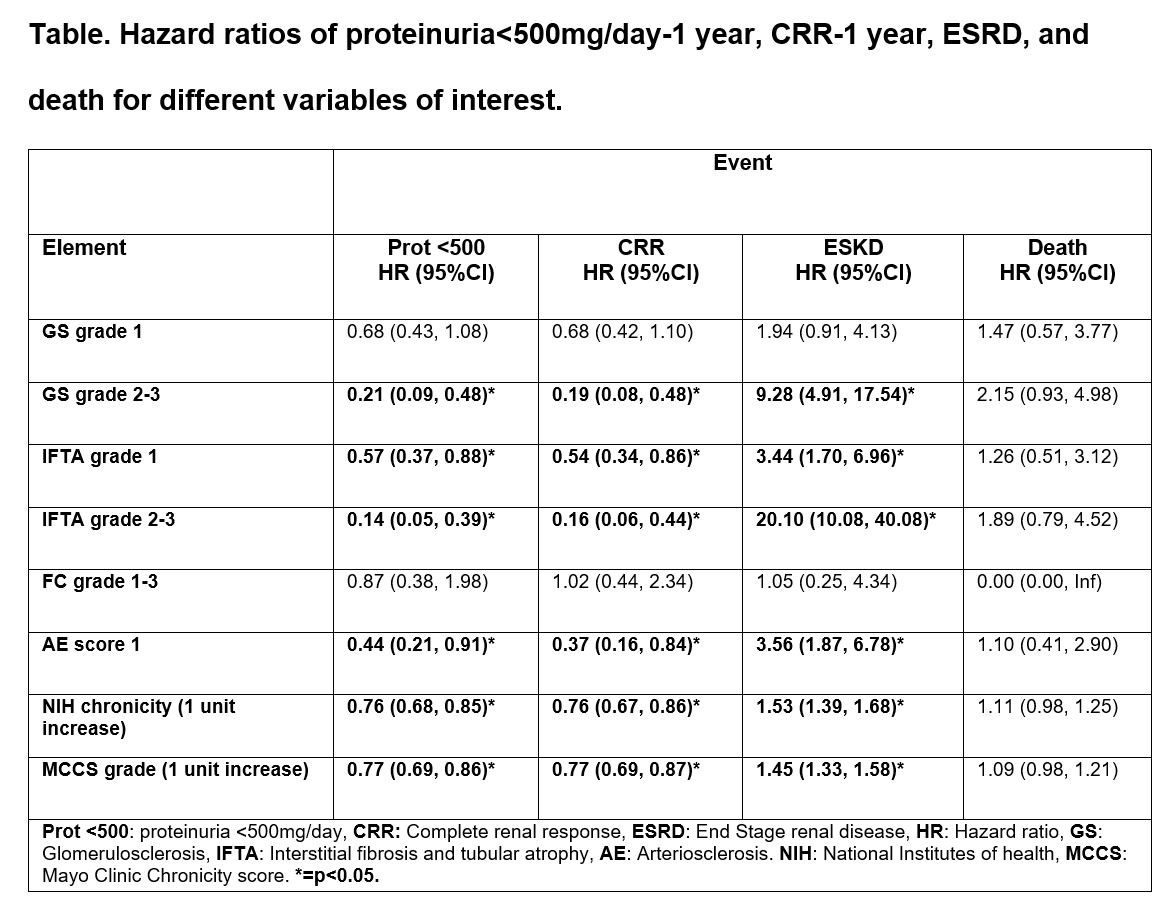Session Information
Session Type: Poster Session B
Session Time: 10:30AM-12:30PM
Background/Purpose: We aimed to assess the predictive value of the individual components of the NIH chronicity score and the Mayo Clinic Chronicity Score (MCCS) in lupus nephritis (LN).
Methods: LN patients from the Mayo Clinic between 1992 and 2023 were included. The earliest kidney biopsy was the index date. Follow-up was until July 2023, death or loss follow-up. Biopsy reports were reviewed by a nephropathologist, and chronic lesions were reclassified (glomerulosclerosis [GS], interstitial fibrosis [IF], tubular atrophy [TA], arteriosclerosis [AE], and fibrous crescents [FC]). The outcomes were proteinuria < 500 mg/day and complete renal response (CRR) within 1 year, defined as proteinuria < 500 mg/day with eGFR decrease of < 20%, end-stage kidney disease (ESKD), and death. We used stratified multivariable proportional hazards regression adjusted for sex and age. P-values < 0.05 were statistically significant.
Results: We included 307 patients (median age, 34 years; 75% female; median follow-up, 11 years). The majority had Class III or IV. FC was present in 4.9% of patients, and AE was present in 12% of patients.
At 1 year, 47.5% had proteinuria < 500 mg/day and 43.4% CRR. Those with grade 2-3 of GS (HR 0.21 [0.09, 0.48] and grade 2-3 IFTA (HR 0.14 [0.05, 0.39] were less likely to achieve proteinuria < 500 mg/day. Grade 2-3 of GS (HR 0.19 [0.08, 0.48]) and grade 2-3 IFTA (HR 0.16 [0.06, 0.44] were also less likely to achieve CRR.
Similarly, those with AE were less likely to have proteinuria < 500 mg/day (HR 0.44 [0.21, 0.91] for mg/day or CRR (HR 0.37 [0.16, 0.84]).
During follow-up, 33 patients died, and 60 developed ESKD. No variables were associated with mortality. Grade 2-3 GS (HR 9.28 [4.91, 17.54], grade 2-3 IFTA (HR 20.10 [10.08, 40.08]), and AE (HR 3.56 [1.87, 6.78]), were associated with an increased ESKD.
Conclusion: GS, IFTA, and AE are independently associated with outcomes in LN. FC is a rare finding in LN. The MCCS included all the chronic histologic elements associated with outcomes in LN.
To cite this abstract in AMA style:
Cuellar-Gutierrez M, Flores Gouyonnet J, Figueroa-Parra G, Casal Moura M, Fervenza F, Hanson A, Crowson C, Sethi S, Duarte-Garcia A. Predictive Value of Chronic Histologic Changes in Lupus Nephritis [abstract]. Arthritis Rheumatol. 2024; 76 (suppl 9). https://acrabstracts.org/abstract/predictive-value-of-chronic-histologic-changes-in-lupus-nephritis/. Accessed .« Back to ACR Convergence 2024
ACR Meeting Abstracts - https://acrabstracts.org/abstract/predictive-value-of-chronic-histologic-changes-in-lupus-nephritis/

